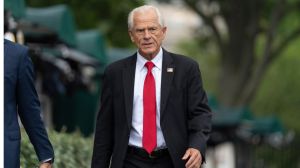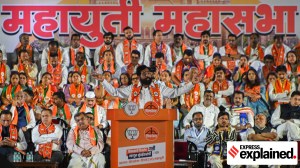Behind Enemy Lines
ON a hot day in July, a man who looks the spitting image of Indian revolutionary Subhas Chandra Bose strolls amid the verdant, sprawling gro...

ON a hot day in July, a man who looks the spitting image of Indian revolutionary Subhas Chandra Bose strolls amid the verdant, sprawling grounds of a neo-baroque castle near Potsdam, west of the German capital Berlin.
Clad in a beige western-style suit, thick-rimmed glasses and a trilby, the portly Netaji is joined by his young wife with blonde curls. The couple walk contentedly in the bright morning sun as the mellifluous notes of an AR Rahman-composed song complete the picture-perfect scene.
It seems perfect to director Shyam Benegal too, who, seated under some trees, roars his approval. The scene is wrapped up. Bose played by actor Sachin Khedekar drops wearily into a chair in the inviting shade, as technicians, both Indian and German, rush to get the equipment in place for the next shot. Benegal, meanwhile, leans back comfortably in his stool.
Benegal8217;s reaction to that is a short laugh. 8220;There are some people in India who don8217;t seem to agree that he got married. Of course there is no marriage certificate8212;Emilie Schenkl wanted to get married according to Hindu rites. More importantly, there was a law in Germany at the time forbidding mixed marriages under Hitler and she would have lost her citizenship.8221;
Bose, who met Schenkl in the 1930s in Vienna, married her soon after and the couple had a daughter, Anita.
An emotional scene in the film, shot in the dusty interiors of the castle, shows a distraught Schenkl, sobbing with her young daughter in her arms. She8217;s just heard the news on the radio of Bose8217;s death on August 18, 1945 in a plane crash.
German actress Anna Prustel, Bose8217;s wife in the film, says, 8220;I guess some people in India are just uncomfortable with the fact that Bose was married to a European woman. But it8217;s really incredible that so few Germans know about Bose8217;s visit to Germany,8221; she exclaims. 8220;This whole co-operation with Hitler, Bose8217;s go-it-alone attitude is simply so unbelievable, it8217;s hard to understand how nobody ever used this material and got it out in the public.8221;
Benegal8217;s three-hour, four-million-euro action-packed film, to be released next year to coincide with Netaji8217;s 107th birthday will now shed light on Bose8217;s two-year stay in Berlin in the early 1940s after his spectacular journey from India in 1941 following British imprisonment.
8220;It8217;s the story of a great adventure, of a flamboyant person who was obviously a romantic as well as a strategist, because who would think of leaving the country and try to raise an army to fight for Indian independence from outside of India?8221; Benegal says.
Bose8217;s plan was to get Hitler8217;s help to stage a revolution in India that would distract British forces from the war against Germany. He calculated that Britain would lose the war against a militarily-superior Germany and as a consequence, lose India as well. But, it obviously didn8217;t work out that way.
The film captures Bose8217;s disappointing meeting with Hitler on May 27, 1942, when the Nazi leader refused to help him and Netaji8217;s raising of a 3,000-strong Indian Legion force, made up of Indian PoWs captured by the Germans in North Africa. The force was meant to spearhead an attack on the British while the Germans swung through the Soviet Union and the Middle East to India. But the German defeat at Stalingrad in 1943 put a brake on Bose8217;s plans.
Benegal8217;s last shot of Bose in Germany shows him boarding the submarine U180 provided by Hitler at the Kiel harbour on the Baltic coast, bound for Japan. The director is clear that his film aims to set the record straight on one of the most controversial political figures in pre-independence India. 8220;Among all the anti-colonial leaders of Asia, Bose is the only one that the British continue to claim was a traitor. Historians have never been certain how to place him.8221;
The director says Netaji is a hero-figure to him. 8220;His idealism was completely free of any kind of cynicism. In that sense he had a very simple and straightforward goal8212;to free India.8221;
- 01
- 02
- 03
- 04
- 05































